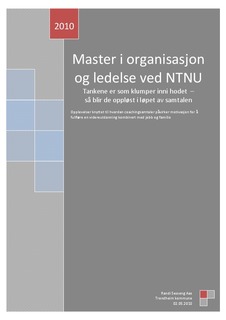Tankene er som klumper inni hodet – så blir de oppløst i løpet av samtalen: Opplevelser knyttet til hvordan coachingsamtaler påvirker motivasjon for å fullføre en videreutdanning kombinert med jobb og familie
Master thesis
Permanent lenke
http://hdl.handle.net/11250/269317Utgivelsesdato
2010Metadata
Vis full innførselSamlinger
Sammendrag
For å besvare problemstillingen, har jeg brukt en kvalitativ metode med en fenomenologisk tilnærming. Det kvalitative forskningsintervjuet er brukt for å samle inn data fra 4 intervjuer. Jeg gjorde lydopptak av intervjuene for å sikre at all informasjonen som ble gitt ble ivaretatt. For å få frem den ønskede informasjonen, har jeg brukt mine coachingferdigheter. Jeg tenker da spesielt på oppfølgingsspørsmål og "danse i øyeblikket". Speiling og oppsummering for å klarlegge at jeg har forstått riktig, er også brukt i denne sammenhengen. I og med at jeg valgte lydopptak av intervjuene, er oppgaven meldt inn for og godkjent av Personvernombudet for forskning ved NSD.
Analysemetoden ble en tematisk analyse med kategorisering og systematisering av informasjonsdata for derigjennom å finne ut hva som motiverer medarbeidere som tar videreutdanning. Analysen er basert på Grounded Theory (Strauss and Corbin 1998). For å finne ut om coaching kan brukes systematisk for å motivere andre medarbeidere til videreutdanning, var det viktig for meg å forstå hva som motiverte de medarbeiderne som holder på med videreutdanning nå. Jeg måtte finne ut hvordan de opplevde oppfølgingssamtalene med meg og hvordan samtalene påvirket motivasjonen deres. Jeg måtte også finne ut hvilken rolle coachingen faktisk har spilt for å si om den er utslagsgivende for å opprettholde motivasjonen. Jeg har diskutert mine egne tanker og oppfatninger opp mot teori og de funn jeg har gjort i analysen.
Jeg har funnet ut at oppfølgingssamtalene har påvirket medarbeidernes indre motivasjon slik at både selvfølelse og mestringsfølelse er styrket. Dette har bidratt til at de har hatt mot og lyst til å fullføre utdanningsforløpet til tross for at det til tider har vært vanskelig å kombinere videreutdanning med jobb og familieliv. Behovet for selvbestemmelse er blitt oppfylt i løpet av samtalene gjennom bevisstgjøring av medarbeidernes rolle i forhold til påvirkning av egen situasjon. Behovet for å føle seg kompetent er stort sett blitt dekket av selve utdanningen. Likeledes har jeg funnet ut at coachingdelen av samtalene har bidratt til de som har en lederrolle på jobb. De har utviklet seg som ledere gjennom at de har styrket sin mestringstro og skapt større trygghet i rollen som leder.
Jeg anbefaler derfor arbeidsgiver å innføre jevnlige coachingsamtaler da disse vil bidra til å sikre en organisasjonsutvikling hvor de ansatte kontinuerlig har læringsfokus i sin jobbsituasjon, enten de har en lederrolle eller ikke. To answer my thesis question I used a qualitative method with a phenomenological approach. The qualitative research interview has been used to gather information from four different participants. I tape recorded all of these four to ensure that all information given was properly stored. I have used my coaching skills to acquire the desired information. Primarily, I am thinking about the following up questions and "the dancing in the moment". Skills to mirror and summarize the participants’ expressions have also been used to clarify that I understood the information correctly. Since I tape recorded the interviews, my assignment has been submitted to and approved by the Privacy Ombudsman for Research at NSD.
The analytical method was a thematic analysis with categorization and systematization of information to uncover what motivates co-workers that attend higher education. The analysis is based on Grounded Theory (Strauss and Corbin 1998) as a procedural technique. To find out if coaching can be systematically used to motivate co-workers and to extend their education further, it was important for me to understand what motivates those who already are attending higher education. I had to discover how they experienced the follow up conversations with me and how these affected their motivation. I also had to uncover what role the coaching conversations actually played, and to see if it is decisive for maintaining motivation. I have discussed my own thoughts and impressions with both theory and the discoveries I made in my analysis.
The follow up conversations have contributed to make both the self-esteem and the sense of mastery of the co-worker's inner motivation stronger. This has encouraged them, and made them want to complete their education further, despite the fact that it can be difficult to combine this with work and family life. The need for self-determination has been fulfilled through the follow up conversations by showing the co-worker’s own role in controlling their own situation. Moreover, the need to feel competent is mostly covered by the education itself. Furthermore, I discovered that the coaching part of the conversations has contributed to make those who already have a leading position more confident. They have also evolved as leaders and strengthened their self-efficacy.
I recommend regular coaching conversations since these will contribute to ensure an organizational development where the employees continuously have a learning focus in their job situation, whether they have a leading role or not.
